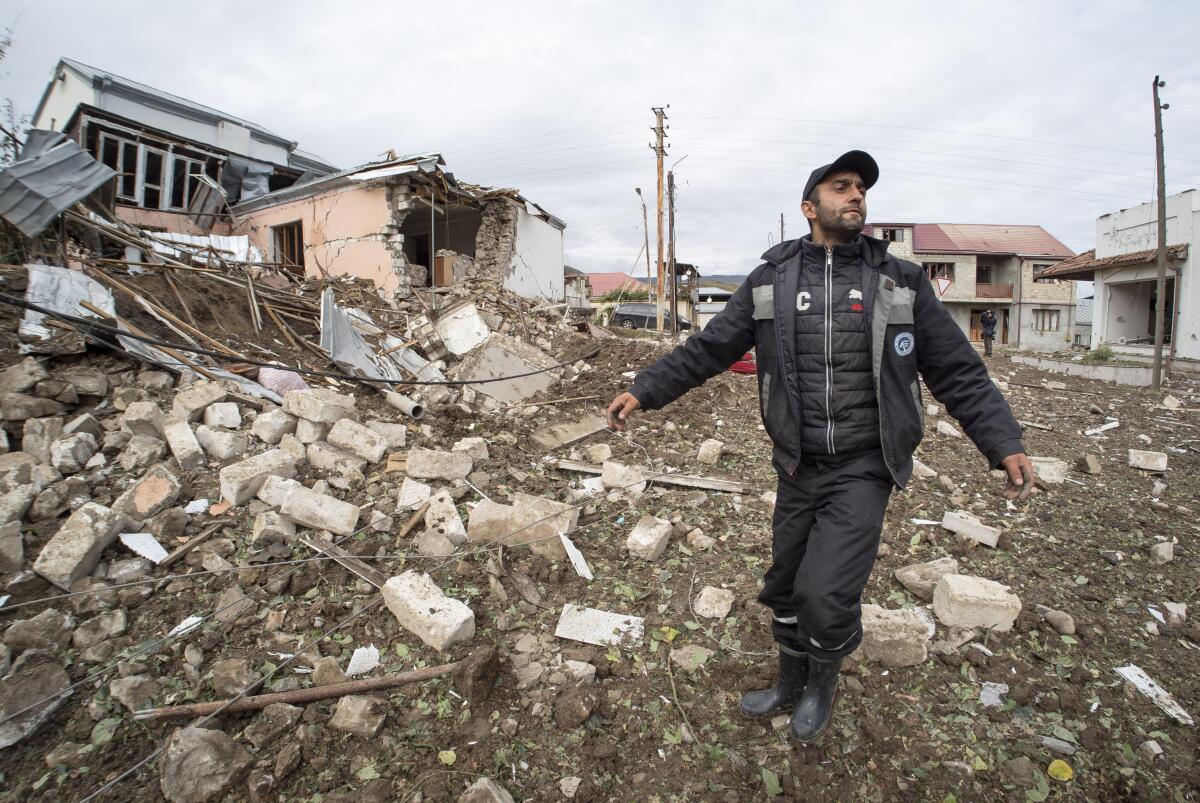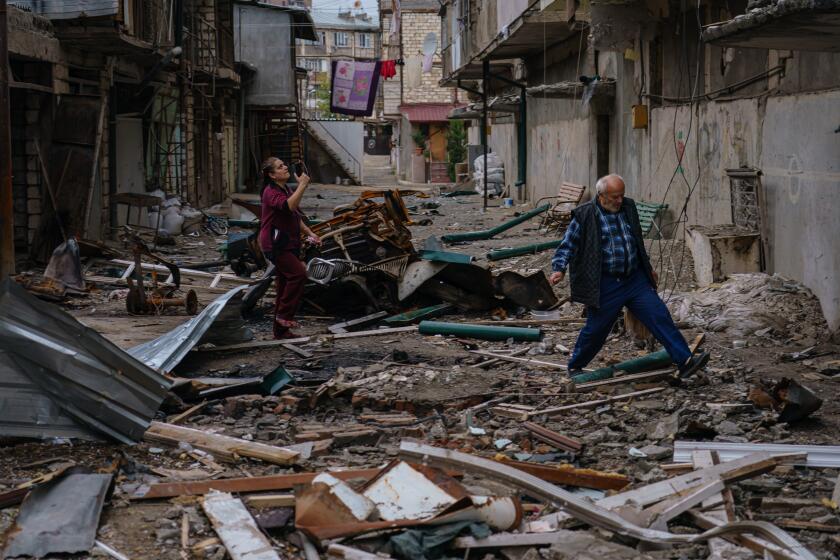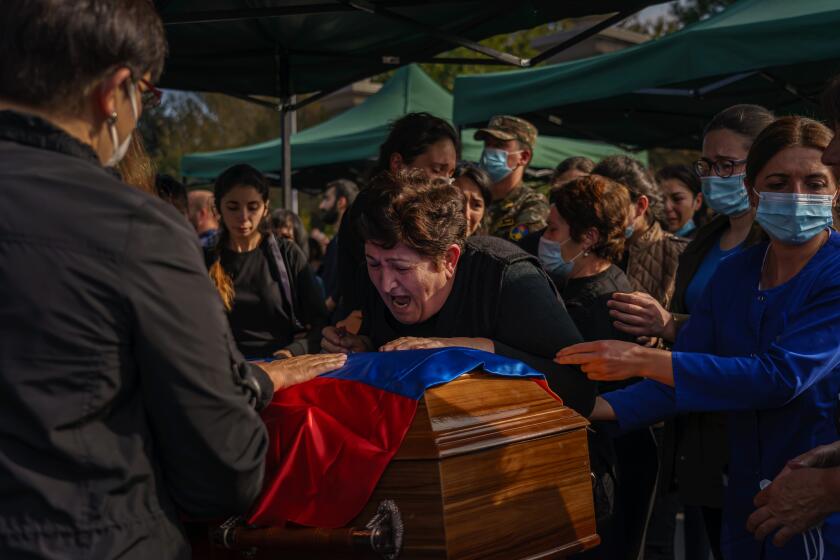In run-up to election, Trump attempts mediation between Armenia and Azerbaijan, Israel and Sudan

- Share via
WASHINGTON — The foreign ministers of Armenia and Azerbaijan, neighboring Caucasus nations at war for nearly a month, pleaded their cases Friday to the Trump administration but emerged with no sign of having found common ground.
It was the first public effort by the U.S. to intervene in the fighting over Nagorno-Karabakh, an ethnic Armenian enclave internationally recognized as part of Azerbaijan. Negotiations led thus far by Russia have failed to halt the bloodshed in a conflict that could swiftly engulf much of the region.
Secretary of State Michael R. Pompeo, saying he wanted to “hear what they’re seeing on the ground,” met separately with the two senior diplomats for about 40 to 50 minutes apiece.
In Friday’s meetings, Pompeo “stressed the importance of the sides entering substantive negotiations” and called for the conflict to be resolved “based on the Helsinki Final Act principles of the nonuse or threat of force, territorial integrity and the equal rights and self-determination of peoples,” State Department spokeswoman Morgan Ortagus said.
President Trump in recent months has stepped up his administration’s attempts at international diplomacy after largely avoiding it for much of his term. In addition to Armenia and Azerbaijan, his administration has sought to improve ties between rival Balkan nations Serbia and Kosovo, and shepherded the diplomatic openings between Israel and the United Arab Emirates and Bahrain.
On Friday, Trump added Sudan to that list, announcing at the White House that Israel and the North African nation have agreed to open diplomatic ties. Earlier this week, Trump told Sudan it would be removed from the U.S. list of “terrorism-sponsoring” nations if it agreed to compensate American victims of Al Qaeda attacks.
After the meeting with Pompeo, Azerbaijani Foreign Minister Jeyhun Bayramov issued a statement saying that his country wanted peace but that “the illegal Armenian occupation” had to end and Azerbaijan’s “territorial integrity restored.”
“Armenia must stop avoiding meaningful negotiations and choose lasting peace,” he said.
The Armenian foreign minister, Zohrab Mnatsakanyan, said later at a speaking engagement that an immediate and enduring cease-fire was essential “to stop the appalling situation” in Nagorno-Karabakh and that Pompeo seemed “optimistic” it could be established.
Both he and his Azerbaijani counterpart, however, accused each other’s nation of carrying out “ethnic cleansing” and other brutal violations in the conflict.
The hostilities raging in Nagorno-Karabakh lie at the heart of a decades-long fight that began during the chaotic breakup of the Soviet Union.
Trump has shown little interest in getting involved in the messy conflict, which has also drawn in NATO ally Turkey in support of Azerbaijan. Armenia has a defense alliance with Russia — which is often at odds with Turkey internationally — and is backed by an enormous Armenian diaspora in the United States.
Trump’s indifference has been criticized by his election rival, former Vice President Joe Biden, who accused the president of ceding leadership to Moscow and failing to defend civilians in the region, including a sizable population of Armenian Christians.
“Inexplicably, the Trump administration has been largely passive and disengaged … even as the region goes up in flames,” Biden said in a statement last week.
Foreshadowing how a Biden government would handle the crisis, Biden called on the U.S. to hold robust talks aimed at a political settlement between the two countries. Biden said it is important to make clear that a military solution is not tenable, to stop “coddling” Turkey, and to warn Turkey and Iran to stay out. Iran borders both Azerbaijan and Armenia.
Mediation over Nagorno-Karabakh seems unlikely to produce an enduring resolution.
Ahead of Friday’s meetings, Pompeo did not offer concrete proposals for what the administration might envision as a solution to the conflict, which dates back decades, if not centuries. U.S. officials demanded neighboring powers halt any transfer of weapons or mercenaries into the battle zone but have not publicized any diplomatic plan.
Their decades-old battle over the mountainous territory of Nagorno-Karabakh has come to define how Armenians and Azerbaijanis view themselves.
Even before Friday’s meetings, Pompeo seemed to tip the U.S. hand in favor of Armenia, a majority Christian nation, against largely Muslim Azerbaijan.
“We’re hopeful that the Armenians will be able to defend against what the Azerbaijanis are doing, and that they will all, before that takes place, get the cease-fire right, and then sit down at the table and try and sort through … what is a truly historic and complicated problem set,” Pompeo told a radio interviewer Oct. 15 in Atlanta.
Asked whether Azerbaijan thought Pompeo and the U.S. were showing bias in favor of Armenia, the Azerbaijani ambassador, Elin Suleymanov, told reporters the secretary of State assured Bayramov of U.S. impartiality and interest in serving as an honest broker.
Analysts say Russia might actually be interested in prolonging the conflict as a way to remind countries of their dependence on Russian-controlled supply lines of oil and gas.
“Until now the United States has taken a back seat,” said Margarita Assenova, senior fellow at the Jamestown Foundation, a Washington think tank that specializes in Eurasia. “More U.S. action would provoke Russian action. The United States could end up with a very hot potato.”
The fighting that erupted in late September has claimed the lives of scores of civilians and military fighters, according to both Armenia and Azerbaijan, and is considered some of the deadliest in years. The conflict dates to the collapse of the Soviet Union. Nagorno-Karabakh is a large region within what are today’s borders of Azerbaijan but with an ethnic Armenian population of roughly 150,000.
“Our view remains, as does the view of nearly every European country, that the right path forward is to cease the conflict, tell them to deescalate — that every country should stay out, provide no fuel for this conflict, no weapons systems, no support,” Pompeo said.
Most negotiations over Nagorno-Karabakh have been led by the so-called Minsk Group, a diplomatic effort formed in 1992 and co-chaired by the U.S., Russia and France. But it has failed to provide a resolution or even a durable cease-fire, diplomats said.
More to Read
Get the L.A. Times Politics newsletter
Deeply reported insights into legislation, politics and policy from Sacramento, Washington and beyond. In your inbox three times per week.
You may occasionally receive promotional content from the Los Angeles Times.













